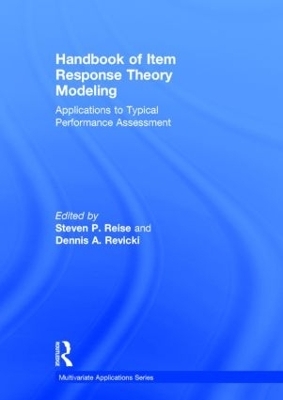
Handbook of Item Response Theory Modeling
Routledge (Verlag)
978-1-84872-972-8 (ISBN)
The book addresses:
IRT models applied to non-educational data especially patient reported outcomes
Differences between cognitive and non-cognitive constructs and the challenges these bring to modeling.
The application of multidimensional IRT models designed to capture typical performance data.
Cutting-edge methods for deriving a single latent dimension from multidimensional data
A new model designed for the measurement of constructs that are defined on one end of a continuum such as substance abuse
Scoring individuals under different multidimensional IRT models and item banking for patient-reported health outcomes
How to evaluate measurement invariance, diagnose problems with response categories, and assess growth and change.
Part 1 reviews fundamental topics such as assumption testing, parameter estimation, and the assessment of model and person fit. New, emerging, and classic IRT models including modeling multidimensional data and the use of new IRT models in typical performance measurement contexts are examined in Part 2. Part 3 reviews the major applications of IRT models such as scoring, item banking for patient-reported health outcomes, evaluating measurement invariance, linking scales to a common metric, and measuring growth and change. The book concludes with a look at future IRT applications in health outcomes measurement. The book summarizes the latest advances and critiques foundational topics such a multidimensionality, assessment of fit, handling non-normality, as well as applied topics such as differential item functioning and multidimensional linking.
Intended for researchers, advanced students, and practitioners in psychology, education, and medicine interested in applying IRT methods, this book also serves as a text in advanced graduate courses on IRT or measurement. Familiarity with factor analysis, latent variables, IRT, and basic measurement theory is assumed.
Steven P. Reise is a full professor in Quantitative Psychology at UCLA. Dennis A. Revicki is Senior Vice President of health outcomes research at Evidera and an adjunct professor at the University of North Carolina, University of Florida, and Georgetown University.
Part 1: Fundamental Issues in Item Response Theory 1. Introduction: Age-Old Problems and Modern Solutions S.P. Reise, D.A. Revicki 2. Evaluating the Impact of Multidimensionality on Unidimensional Item Response Theory Model Parameters S.P. Reise, K.F. Cook, T.M. Moore 3. Modern Approaches to Parameter Estimation in Item Response Theory L. Cai, D. Thissen 4. Estimating the Latent Density in Unidimensional IRT to Permit Nonnormality C.M. Woods 5. The Use of Nonparametric Item Response Theory to Explore Data Quality R.R. Meijer, J.N. Tendeiro, R.B. K. Wanders 6. Evaluating the Fit of IRT models A. Maydeu-Olivares 7. Assessing Person Fit in Typical-Response Measures P. J. Ferrando Part 2: Classic and Emerging IRT Modeling Approaches 8. Three (or Four) Factors, Four (or Three) Models M.C. Edwards, R. J. Wirth, C.R. Houts, A.J. Bodine 9. Using Hierarchical IRT Models to Create Unidimensional Measures from Multidimensional Data B.D. Stucky, M.O. Edelen 10. An Illustration of the Two-Tier Item Factor Analysis Model W.E. Bonifay 11. Using Projected Locally Dependent Unidimensional Models to Measure Multidimensional Response Data E.H. Ip, S. Chen 12. Multidimensional Explanatory Item Response Modeling P.D. Boeck, M. Wilson 13. Unipolar Item Response Models J.F. Lucke 14. Selecting Among Polytomous IRT Models R. Ostini, M. Finkelman, M. Nering Part 3: Using IRT Models in Applied Problems 15. Scoring and Estimating Score Precision Using Multidimensional IRT Models A. Brown, T.J. Croudace 16. Developing Item Banks for Patient-Reported Health Outcomes D.A. Revicki, W. Chen, C. Tucker 17. Using Item Response Theory to Evaluate Measurement Invariance in Health-Related Measures R.E. Millsap, H. Gunn, H.T. Everson, A. Zautra 18. Detecting Faulty Within-Item Category Functioning with the Nominal Response Model K.S. J. Preston, S.P. Reise 19. Multidimensional Test Linking J.P. Weeks 20. IRT for Growth and Change J.J. McArdle, K.T. Petway, E.S. Hishinuma 21. Summary: New IRT Problems and Future Directions S.P. Reise, D.A. Revicki
| Erscheint lt. Verlag | 19.12.2014 |
|---|---|
| Reihe/Serie | Multivariate Applications Series |
| Zusatzinfo | 86 Tables, black and white; 51 Line drawings, black and white; 18 Halftones, black and white; 69 Illustrations, black and white |
| Verlagsort | London |
| Sprache | englisch |
| Maße | 178 x 254 mm |
| Gewicht | 1060 g |
| Themenwelt | Geisteswissenschaften ► Psychologie ► Allgemeine Psychologie |
| Geisteswissenschaften ► Psychologie ► Klinische Psychologie | |
| Geisteswissenschaften ► Psychologie ► Test in der Psychologie | |
| Medizin / Pharmazie ► Medizinische Fachgebiete ► Psychiatrie / Psychotherapie | |
| Studium ► Querschnittsbereiche ► Epidemiologie / Med. Biometrie | |
| Sozialwissenschaften ► Pädagogik | |
| ISBN-10 | 1-84872-972-3 / 1848729723 |
| ISBN-13 | 978-1-84872-972-8 / 9781848729728 |
| Zustand | Neuware |
| Haben Sie eine Frage zum Produkt? |
aus dem Bereich


